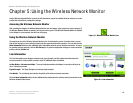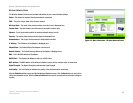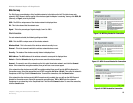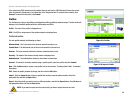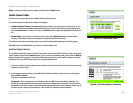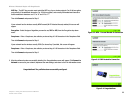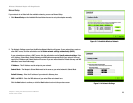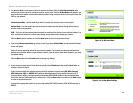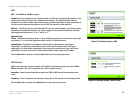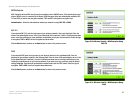
24
Chapter 5: Using the Wireless Network Monitor
Create a New Profile
Wireless-G Notebook Adapter with RangeBooster
3. The Wireless Mode screen shows a choice of two wireless modes. Click the Infrastructure Mode radio
button if you want to connect to a wireless router or access point. Click the Ad-Hoc Mode radio button if you
want to connect to another wireless device directly without using a wireless router or access point. Enter the
SSID for your network.
Infrastructure Mode - Use this mode if you want to connect to a wireless router or access point.
Ad-Hoc Mode - Use this mode if you want to connect to another wireless device directly without using a
wireless router or access point.
SSID - This is the wireless network name that must be used for all the devices in your wireless network. It is
case- sensitive and should be a unique name to help prevent others from entering your network.
Click the Next button to continue, or click the Back button to return to the previous screen.
4. If you chose Infrastructure Mode, go to Step 5 now. If you chose Ad-Hoc Mode, the Ad-Hoc Mode Settings
screen will appear.
Select the correct operating channel for your wireless network. The channel you choose should match the
channel set on the other devices in your wireless network. If you are unsure about which channel to use, keep
the default setting.
Click the Next button. Click the Back button to change any settings.
5. If your wireless network doesn’t have wireless security, select Disabled and then click the Next button to
continue. Proceed to Step 6.
If your wireless network has wireless security, select the method of security used: WEP, WPA-Personal,
WPA-Enterprise, PSK2, or RADIUS. WEP stands for Wired Equivalent Privacy, and WPA stands for Wi-Fi
Protected Access. WPA is a stronger security method than WEP. RADIUS stands for Remote Authentication
Dial-In User Service. PSK2 stands for Pre-shared Key 2. Click the Next button to continue or the Back button
to return to the previous screen.
Proceed to the appropriate section for your security method: WEP, WPA-Personal, PSK2, WPA-Enterprise, or
RADIUS.
Figure 5-15: Wireless Mode
Figure 5-16: Ad-Hoc Mode Settings



